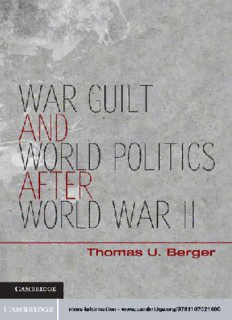
War, Guilt, and World Politics after World War II PDF
Preview War, Guilt, and World Politics after World War II
War,Guilt,andWorldPoliticsafterWorldWarII Whendostateschoosetoadoptapenitentstancetowardthepast?When dotheychoosetoofferapologiesforhistoricalmisdeeds,offercompensa- tiontotheirvictims,andincorporatethedarkersidesofhistoryintotheir textbooks,publicmonuments,andmuseums?Whendotheychoosenotto doso?Andwhatarethepoliticalconsequencesofhowstatesportraythe past? This book pursues these questions by examining how governments in post-1945 Austria, Germany, and Japan have wrestled with the difficult legacyofWorldWarIIandtheimpactoftheirpoliciesonregionalpolitics inEuropeandAsia.Thebookarguesthatstatescanreconcileoverhistor- icalissues,buttodosorequiresgreaterpoliticalwillandimposesgreater coststhaniscommonlyrealized.Atthesametime,inanincreasinglyinter- dependentworld,failuretodosocanhaveaprofoundlydisruptiveeffect onregionalrelationsandfeeddangerousgeopoliticaltensions. Thomas U. Berger is an Associate Professor in the Department of Inter- national Relations at Boston University. He is the author of Cultures of Antimilitarism:NationalSecurityinGermanyandJapanandofRedefining JapanandtheU.S.-JapanAllianceandcoeditorofJapaninInternational Politics:BeyondtheReactiveState.Hehaspublishedextensivelyonissues relating to East Asian and European international relations, including essays that have appeared in International Security, Review of Interna- tionalStudies,GermanPolitics,andAsianSecurity.Hisprimaryresearch areasincludeinternationalsecurity,internationalmigration,andthepol- iticsofmemoryandhistoricalrepresentation.Priortojoiningthefaculty at Boston University in 2001, he was an Associate Professor at Johns Hopkins University. He has held a number of postdoctoral and research fellowships, including the Harvard Academy Junior Researcher Fellow- ship, the Olin Postdoctoral Fellowship in International Security Studies, and Fulbright, Japan Foundation, MacArthur, and DAAD doctoral re- searchfellowships.HereceivedhisPhDinPoliticalSciencefromMITand hisBAfromColumbiaCollege. War, Guilt, and World Politics after World War II THOMAS U. BERGER BostonUniversity cambridgeuniversitypress Cambridge,NewYork,Melbourne,Madrid,CapeTown, Singapore,Sa˜oPaulo,Delhi,MexicoCity CambridgeUniversityPress 32AvenueoftheAmericas,NewYork,ny10013-2473,usa www.cambridge.org Informationonthistitle:www.cambridge.org/9781107674950 (cid:2)C ThomasU.Berger2012 Thispublicationisincopyright.Subjecttostatutoryexception andtotheprovisionsofrelevantcollectivelicensingagreements, noreproductionofanypartmaytakeplacewithoutthewritten permissionofCambridgeUniversityPress. Firstpublished2012 PrintedintheUnitedStatesofAmerica AcatalogrecordforthispublicationisavailablefromtheBritishLibrary. LibraryofCongressCataloginginPublicationData Berger,ThomasU. War,guilt,andworldpoliticsafterWorldWarII/ThomasU.Berger. pages cm Includesbibliographicalreferencesandindex. isbn978-1-107-02160-0(hardback)–isbn978-1-107-67495-0(paperback) 1.WorldWar, 1939–1945–Reparations. 2.WorldWar,1939–1945–Historiography. 3.Restitution– Europe. 4.Reparationsforhistoricalinjustices–Europe. 5.Culturalproperty–Repatriation– Europe. 6.WorldWar,1939–1945–Confiscationsandcontributions–Europe. 7.Guilt– Politicalaspects. 8.WorldWar,1939–1945–Psychologicalaspects. 9.Warvictims. I.Title. d818.b47 2012 940.53(cid:3)14–dc23 2011051170 isbn978-1-107-02160-0Hardback isbn978-1-107-67495-0Paperback CambridgeUniversityPresshasnoresponsibilityforthepersistenceoraccuracyofurlsfor externalorthird-partyInternetWebsitesreferredtointhispublicationanddoesnotguarantee thatanycontentonsuchWebsitesis,orwillremain,accurateorappropriate. Contents Tables pagevii Introduction 1 1 PoliticsandMemoryinanAgeofApology 8 2 Germany:TheModelPenitent 35 3 Austria:TheProdigalPenitent 83 4 Japan:TheModelImpenitent? 123 5 TheGeopoliticsofRememberingandForgettinginAsia, 1991–2010:TowardanExpandedModel 175 6 Conclusions:VarietiesofPenance 230 Index 251 v Tables 1.1 Summaryofdifferentapproachestoexplainingthe determinantsofofficialhistoricalnarratives page31 5.1 KoreanviewsofJapan 200 5.2 JapaneseviewsofKorea 201 5.3 Japanesepublic’sviewofChina1978–2009 223 5.4 Japanesepublicperceptionoftheriskofwar,1969–2009 225 vii
Description: